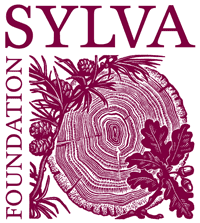Guest blog by Sylva Scholar, Louise Hill
We congratulate Louise Hill on successfully defending her DPhil at the University of Oxford. Louise is the third (and sadly final) Oxford-Sylva scholar. Over the last four years she has been researching the impacts of ash dieback. Here Louise describes in her own words what she has achieved, and what our support has meant to her personally. Well done Louise!
It’s been a long road to get here, but four and a half years after starting I have finally finished my DPhil. As the Sylva Scholar, I have been extremely privileged to complete my project at the University of Oxford, with opportunities to meet top scientists, speak at international conferences, and produce the best research that I am capable of.

Louise Hill, Sylva scholar, in Wytham Woods. Photo John Cairns
My research project looked at various different aspects of the ash dieback outbreak in Britain. This disease is one of the most important contemporary challenges to the health of our woods and trees. An invasive fungal pathogen (Hymenoscyphus pseudoalbidus) [Ed. formerly known as Chalara fraxinea], it threatens the future of common ash (Fraxinus excelsior) as a dominant tree in Britain. The impacts of this loss will be widespread: over the coming decades we are likely to see significant impacts on the health of woodland and non-woodland ecosystems, on associated biodiversity, and on human health and wellbeing as the benefits of ash trees to society are lost.
My project was broad and investigated impacts in many of these areas.
- I carried out experimental work to clarify the impacts of ash loss on woodland ground flora and invertebrate communities.
- I modelled the distributions of trees and their associated traits and functions (with a paper published in Ecology and Evolution: http://onlinelibrary.wiley.com/doi/10.1002/ece3.2661/full). This allowed me to investigate the areas and ecosystem types most vulnerable ash loss, and to develop management guidance to help mitigate this loss (paper in review).
- In my final year, I investigated the economic impacts, an ambitious project which I am now developing further with collaborators at the Woodland Trust and Fera, and which we hope will produce a high-impact publication with political significance.
It’s been a lot of hard work, but I have come away with something I feel really proud of: a project that I could make fully my own, that I believe has contributed to both the scientific understanding of the disease and to practical measures to reduce its harm.
None of this would have been possible without support and input from the Sylva Foundation: the scholarship gave me a fantastic opportunity, and I have tried my best to make the most of it. This experience culminated a couple of weeks ago in an invitation to attend a Plant Health and Biosecurity conference at Highgrove, contributing directly to ideas for future policy.
I hope in the future I can carry on working on research in tree diseases in the future, as this project has given me a real drive to continue in this important area.
Louise Hill
[Note from Ed: Louise Hill’s thesis will soon be available online. We will publish a link as soon as possible.]More about the Sylva Scholarship
Sadly Louise is our third and final Oxford-Sylva Graduate Scholar, as we have been unsuccessful in fundraising sufficiently to appoint a new student.




